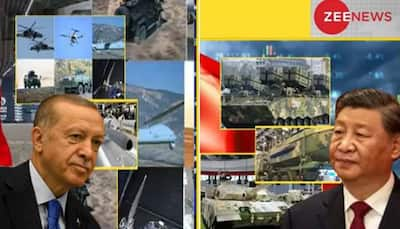Following the recent war-like conflict between India and Pakistan, the impact of Newton’s law—every action has an equal and opposite reaction—can now be seen in the stock markets of defence companies in China, Turkey, and India. While defence stocks in China and Turkey are experiencing sharp declines, Indian defence stocks are witnessing a significant surge. Simply put, from the battlefield to the stock market, Chinese and Turkish weapons have been exposed and beaten.
Pakistan relied heavily on Chinese and Turkish drones, fighter jets, and missiles during the conflict with India. However, these systems proved ineffective against India’s defence capabilities. This poor performance has raised serious questions about the reliability and quality of Chinese and Turkish defence products. In today’s DNA, Rahul Sinha, Managing Editor, of Zee News, analysed the impact of India’s defence power on Turkey, China.
बॉर्डर पर ‘ड्रोन वॉर’..अब ‘न्यू नॉर्मल’ है?
पाकिस्तान..अपनी हार का जश्न क्यों मनाता है?
देखिए LIVE Rahul Sinha के साथ
— Zee News (@ZeeNews)
There’s a popular saying in the business world: “The market knows everything, and price is king.” Today, China’s HS China A Aerospace & Defence Index fell by over 2%, with individual defence stocks seeing declines ranging from 2% to 7%. Notably, AVIC Chengdu, which manufactures the JF-17 Thunder and J-10C fighter jets—used by Pakistan during the conflict—saw its stock fall 7% after the conditional ceasefire between India and Pakistan. Pakistan’s Foreign Minister Ishaq Dar had previously confirmed the use of the J-10C jets against India.
Similarly, Zhuzhou Hongda Electronics Corporation Ltd, which produces the PL-15 missile, witnessed a drop of more than 6%. The company is state-owned and plays a significant role in China’s missile development. While Chinese and Turkish defence stocks fell after the ceasefire, Indian defence companies surged. Bharat Dynamics Limited, a government-owned missile manufacturer, rose by over 10%. Bharat Electronics Ltd (BEL), which supplies to the aerospace sector, saw a rise of over 4%. Shipbuilding companies also gained between 4% and 6%.
On the other hand, Turkish defence giant Aselsan A.S., which manufactures everything from tanks to drones, witnessed a sharp decline of over 12% in its shares over the past three days—starting Friday. This follows the Indian defence system’s complete neutralization of Turkish drones.
* Global confidence in Chinese and Turkish defence systems has eroded.
* Demand for their defence products is likely to decline in coming months.
* Indian-made defence products are gaining both demand and trust globally.
* India is set to increase its defence spending under the “Make in India” push, already announced by the Prime Minister.
* India-Russia defence relations are expected to strengthen further.
According to a report by the Stockholm International Peace Research Institute (SIPRI), India sources its defence equipment primarily from:
Russia (36%)
France (33%)
Israel (18%)
Others (13%)
(e.g., S-400 from Russia, Rafale jets from France)
China (81%)
Turkey (~4%)
Netherlands (~5.5%)
Others (>9%)
As the saying goes, every crisis presents an opportunity. China and Turkey tried to capitalize on the India-Pakistan conflict—but their defence systems were exposed and discredited, while India’s indigenous defence capabilities earned global trust. So, is this the beginning of the end for the Chinese-Turkish defence market dominance? Only time will tell—but the signals are clear.
Stay informed on all the , real-time updates, and follow all the important headlines in and on Zee News.








